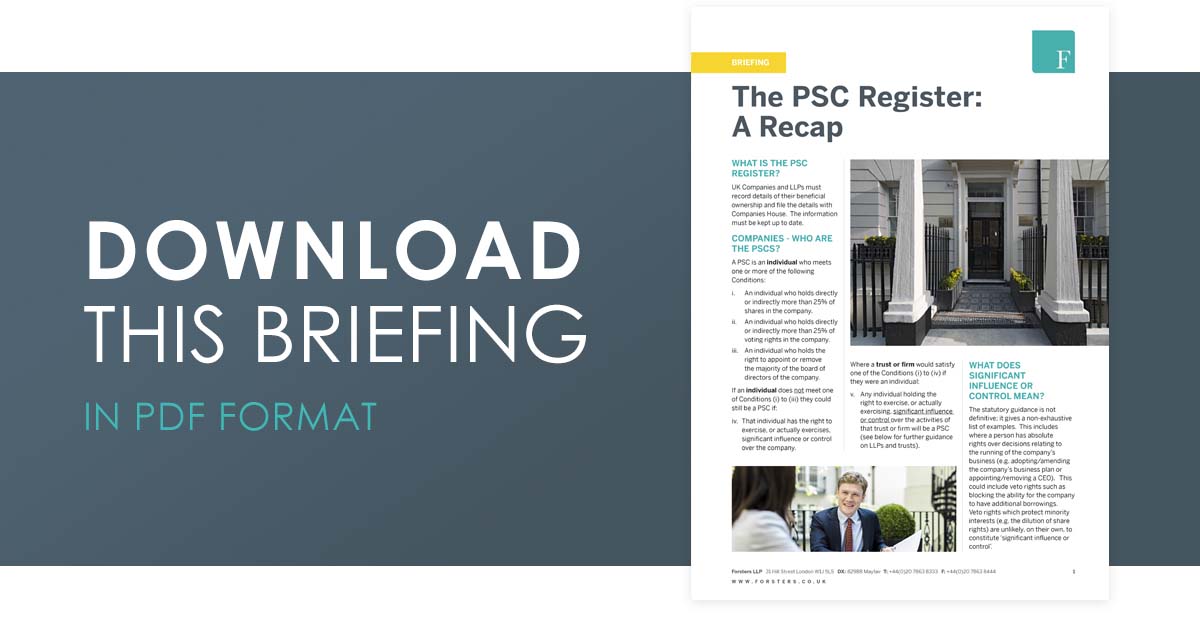The PSC Register: A Recap

What is the PSC Register?
UK Companies and LLPs must record details of their beneficial ownership and file the details with Companies House. The information must be kept up to date.
Companies – who are the PSCs?
A PSC is an individual who meets one or more of the following Conditions:
- An individual who holds directly or indirectly more than 25% of shares in the company.
- An individual who holds directly or indirectly more than 25% of voting rights in the company.
- An individual who holds the right to appoint or remove the majority of the board of directors of the company.
If an individual does not meet one of Conditions (i) to (iii) they could still be a PSC if:
- That individual has the right to exercise, or actually exercises, significant influence or control over the company.
Where a trust or firm would satisfy one of the Conditions (i) to (iv) if they were an individual:
- Any individual holding the right to exercise, or actually exercising, significant influence or control over the activities of that trust or firm will be a PSC (see below for further guidance on LLPs and trusts).
What does significant influence or control mean?
The statutory guidance is not definitive; it gives a non-exhaustive list of examples. This includes where a person has absolute rights over decisions relating to the running of the company’s business (e.g. adopting/amending the company’s business plan or appointing/removing a CEO). This could include veto rights such as blocking the ability for the company to have additional borrowings. Veto rights which protect minority interests (e.g. the dilution of share rights) are unlikely, on their own, to constitute ‘significant influence or control’.
What happens when a trust holds shares in a UK company?
The guidance on Condition (v) stipulates that the right to exercise significant influence or control over a trust (regardless of whether this is actually exercised or not) will be present where a person has the ability to direct or influence the activities of a trust, including but not limited to the following examples:
- The right to appoint or remove trustees.
- The right to direct the distribution of funds or assets.
- The right to direct investment decisions in respect of the trust fund.
- The right to amend the trust deed.
- The right to revoke or terminate a trust.
Condition (v) may catch individuals, other than the trustees, who need to report. For example, the Settlor may have the power to appoint trustees during his or her lifetime.
As trustees hold shares in a company jointly, each of them is deemed to hold the total number of shares or rights held by all of them. If, for example, a trust holds 30% of the shares in a company, each trustee must be entered on the PSC register as they meet Condition (i).
What happens when companies hold shares in a UK company?
Where shares are owned by a company, that company could be required to register on the PSC register as a Relevant Legal Entity (RLE) if:
- It is capable of satisfying one of the PSC Conditions.
- It is required to keep a PSC register itself or is listed on a regulated market in the UK, the EEA (other than the UK) or on specified markets in Switzerland, the USA, Japan and Israel.
- An RLE is registrable in relation to the shares it holds if it is the first legal entity on the company’s ownership chain.
If an individual does not meet one of Conditions (i) to (iii) they could still be a PSC if:
- They have the right to exercise, or actually exercises, significant influence or control.
Where a trust or firm would satisfy one of the Conditions (i) to (iv) if they were an individual:
- Any individual with a right to exercise, or actually exercises, significant influence or control over the activities of a trust or firm will be a PSC.
Determining which, if any, of the above Conditions apply requires a thorough review of the LLP agreement and any other documents relevant to rights over surplus assets. The guidance on the meaning of ‘significant influence or control’ for LLPs is similar to the company guidance but points to the ability to amend the LLP agreement and to members who hold strategic assets or who have key relationships important to the running of the business as being indicators of significant influence or control.
What do you need to do?
Companies and LLPs will need to provide the information on their register to Companies House within 14 days of making a change to their own register. The PSC register at Companies House is publicly accessible.
Companies and LLPs will need to make their own PSC register available for inspection on request at the registered office or provide copies on request.
What happens if you don’t?
Failure to provide accurate information on the PSC register and failure to comply with notices requiring someone to provide information are criminal offences and may result in a fine and or a prison sentence of up to two years.
Common errors
Here are two of the most common errors made in relation to the PSC register:
- Trustees cannot meet Condition (v) as this applies to people other than trustees. Trustees will be PSCs by virtue of Conditions (i) to (iii).
- Offshore companies should not be registered on the PSC register as they do not fulfil the RLE criteria.





